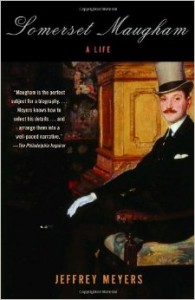Published in: July-August 2004 issue.
 Somerset Maugham: A Life
Somerset Maugham: A Life
by Jeffrey Meyers
Knopf. 432 pages, $30.
One thing that comes through clearly in this new biography by Jeffrey Meyers is that W. Somerset Maugham was not an easy man to know. A multi-talented workaholic who avoided speaking at length due to a lifelong stammer, he poured a great deal of emotional energy into his career and had little left over for other human beings.
Maugham was born in France in 1874 to British parents who were affectionate and reasonable by Victorian standards, albeit often absent.






